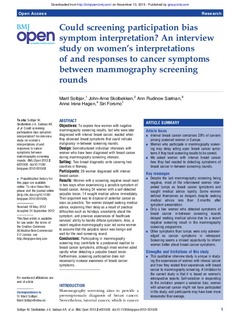Could screening participation bias symptom interpretation? An interview study on women's interpretations of and responses to cancer symptoms between mammography screening rounds
Abstract
Objectives: To explore how women with negative mammography screening results, but who were later diagnosed with interval breast cancer, reacted when they observed breast symptoms that could indicate malignancy in-between screening rounds.
Design: Semistructured individual interviews with women who have been diagnosed with breast cancer during mammography screening intervals.
Setting: Two breast diagnostic units covering two counties in Norway.
Participants: 26 women diagnosed with interval breast cancer.
Results: Women with a screening negative result react in two ways when experiencing a possible symptom of breast cancer. Among 24 women with a self-detected palpable lesion, 14 sought medical advice immediately. Their argument was to dispose of potential cancer as soon as possible. Ten women delayed seeking medical advice, explaining their delay as a result of practical difficulties such as holidays, uncertainty about the symptom, and previous experiences of healthcare services’ ability to handle diffuse symptoms. Also, a recent negative mammography scan led some women to assume that the palpable lesion was benign and wait for the next screening round.
Conclusions: Participating in mammography screening may contribute to a postponed reaction to breast cancer symptoms, although most women acted rapidly when detecting a palpable breast lesion. Furthermore, screening participation does not necessarily increase awareness of breast cancer symptoms.
